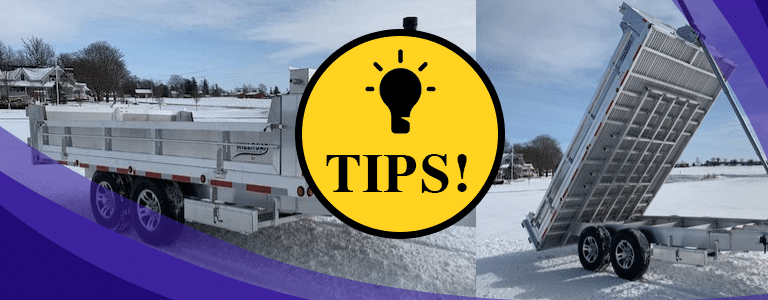
August 21, 2020 Last updated on June 16, 2023 by Bob Fisher Bob Fisher Tilt/Dump Trailers
As the fall months begin, you may be using your custom dump trailer more to get those last few chores done before the snow flies. But do not forget to start thinking about winter and where you will store it through the coldest part of the year. Snow and ice can take a toll on your trailer. Leaving it in one place for five to six months stresses the tires. Learn how to winterize your trailer so that it is ready for spring when you want to get started on your spring-cleaning chores.
1. Clean and dry your trailer out. Go over every part to remove all the dirt, grime and grease stains. Do not forget to flush the undercarriage, especially if you used the trailer on a road that was salted or chemically treated for bad weather. Cleaning it up before you store it will make sure that it does not corrode through the damp months ahead.
2. If your trailer has any rust, deal with it before you store the trailer for the season. Rust is not going to get better, only worse. Any section of your trailer that has rust can be replaced or cleaned to prevent it from spreading.
3. Inspect the wheels and wheel bearings. You will save time by dealing with the wheels before winter than waiting until spring. Repair companies get very busy when everyone is trying to get their trailer geared up for spring-cleaning.
4. Lubricate the moving parts, and check the hydraulic oil. Even though your trailer may not move over the winter, doing it now protects the joints and bearings that need lubrication. If your trailer has any water pipes, drain the water before storing. Freezing water expands, which will most certainly blow out your system.
5. Pull out batteries in your trailer, if it has them. Batteries can leak acid and corrode over the colder months. It will be a mess after four to five months of storage.
6. Repaint your trailer before it goes into storage to protect the outer surface. At the very least, touch up spots that look a little worn.
7. Find a safe place to store the trailer. A barn or garage may suffice, but you want the trailer out of the elements. It is better for the tires to be parked on a concrete or gravel surface than dirt. Grass and dirt can trap pests and other contaminants that damage the tires. If you cannot find a concrete or asphalt surface, put a couple of boards down.
8. A cover for the trailer is optional, but if you do use one, get a custom cover that protects it from the top to the tires, not one that only extends to the fender.
Winterizing your trailer protects it through the colder months. Before you take it out in the spring, you will want to re-inspect and check it for damage that occurred. You may need to lubricate the moving parts and look for rust damage before putting your equipment back to work.
Your trailer will not last forever, but you can certainly make sure that it does last longer by winterizing it. When you are ready to upgrade your trailer because it has outlived its life or you need a bigger one to handle new jobs, check out the stock on our website. We have a large inventory to match a trailer to your needs. We can also custom design a trailer for your specific requirements.
Find custom trailers for all your needs with Millroad Manufacturing.